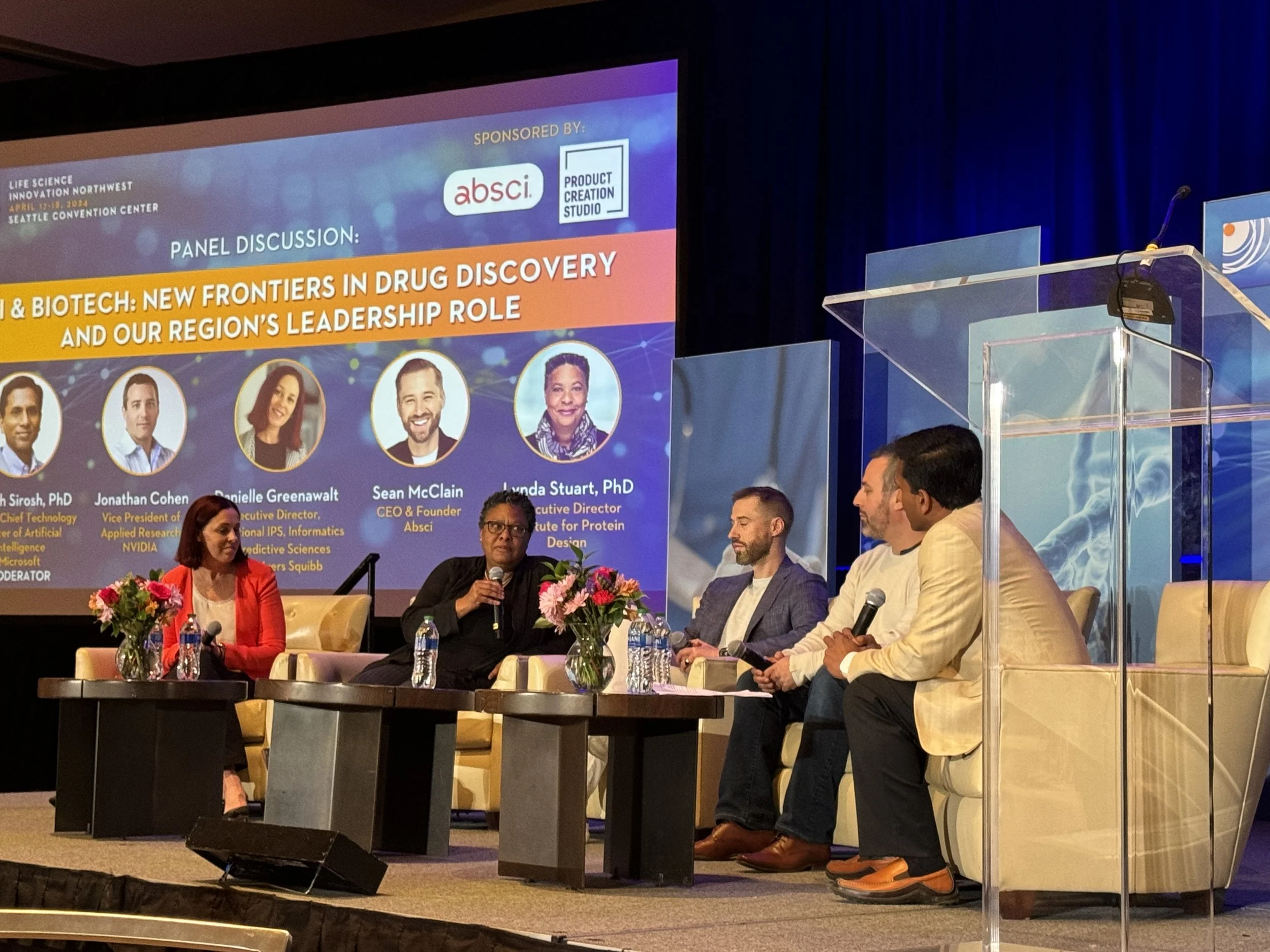Exploring AI's Role in Biotech: LSINW MedTech Panel Discusses New Frontiers in Drug Discovery
During last week's LSINW 2024 event, our CTO, Scott Thielman, introduced an esteemed panel moderated by Dr. Joseph Sirosh, former Chief Technology Officer of Artificial Intelligence at Microsoft. The panel featured leaders from the local biotech community and explored the intersection of AI, biotechnology, and the life sciences.
Dr. Sirosh set the stage, emphasizing this unique moment in history. We are seeing the convergence of biologics and computational power, particularly in the PNW, presenting unprecedented opportunities, paving the way for Seattle to spearhead a new era of therapeutic design.
The panel conversation highlighted emerging trends and challenged conventional thinking about complex issues such as cancer, auto-immunity, and the mysteries of neuroscience. Here are some of our favorite highlights.
Has one big thing in AI caught your attention over the last 18 months?
Lynda Stuart, PhD and Executive Director at the Institute for Protein Design highlighted the convergence of three significant developments in AI over the past 18 months:
Power of Generative Diffusion-based Models: These models can create entirely new shapes, breaking free from the constraints of natural evolution. This opens up opportunities to explore uncharted territories in drug discovery and design.
Amino Acid Sequence Prediction: Advances in predicting amino acid sequences have provided valuable insights into protein structures and functions, enabling more precise and efficient drug development processes.
Structure Prediction: Improvements in structure prediction algorithms have revolutionized our ability to predict the three-dimensional structures of proteins, facilitating the design of novel therapeutics with enhanced efficacy.
These advancements, coupled with tools such as RoseTTAFold and RFdiffusion, have empowered researchers to push the boundaries of what is possible in AI-driven drug discovery and development.
Sean McClain, CEO and founder at Absci, emphasized the unique environment cultivated in Washington state. Research conducted at companies like Microsoft and Absci drives innovation in AI-driven drug discovery.
He highlighted the focus on leveraging Generative AI to design antibodies or proteins with novel properties that cannot be found in nature. This approach enables the exploration of a much larger space, unlocking new biology and accelerating drug development processes.
McClain noted that this approach allows for more efficient resource use, enabling more drug candidates to progress into clinical trials faster and at lower cost than traditional methods. He attributed these advancements to the work in the PNW, particularly in utilizing AI to design proteins and antibodies from scratch.
Looking ahead, McClain expressed optimism about further breakthroughs in utilizing AI to tailor the properties of proteins and antibodies to align with specific therapeutic hypotheses. He acknowledged that progress is still being made but highlighted the significant advancements made in the past 18-24 months in the protein space within the PNW, indicating a promising future for AI-driven drug discovery in the region.
What excites you about machine learning and AI? What is the one thing catching your eye?
Danielle Greenwalt, Executive Director of Translational IPS, Informatics, and Predictive Sciences at Bristol Myers Squibb, expressed excitement about leveraging AI and machine learning in clinical trial design and execution.
One key area of excitement is utilizing internal data to inform and optimize clinical trial processes. By leveraging machine learning algorithms on internal data, they can more efficiently identify suitable patients for clinical trials. This allows for faster drug development and scalability of clinical trials.
Greenwalt also emphasized the significance of utilizing AI to define the parameters of a clinical trial and predict its success. For instance, AI can analyze patient data to determine if a specific genomic sequence exists within the target population for a trial.
This proactive approach ensures the efficiency of clinical trial execution by identifying potential challenges beforehand.
What would you like to see in the next five years?
Lynda Stuart envisions a future where AI-driven approaches revolutionize biomedical research and development for everyone in the industry, not just specific organizations like Microsoft and Absci.
She aims to shorten discovery timelines and improve translational development through quality-by-design principles.
Stuart believes it's possible to address manufacturing issues, predict biodistribution rapidly, and engineer features at the beginning of the product development process. She questions whether computational methods like AI can transform the landscape of biomedical research and development, acknowledging its enormous power but emphasizing the importance of human expertise and nuance.
Generative AI for the de novo antibody design. Photo Credit: Absci
Sean McClain, CEO & Founder at Absci, envisions a transformative future for the biomedical industry through the widespread adoption of artificial intelligence.
Absci's AI model enables precise antibody design, revolutionizing epitope targeting and facilitating the exploration of new biology. “We see this as an exciting new breakthrough” that accelerates drug discovery timelines and transforms the economics of traditional biotech, where you can control where antibodies bind and how tightly in an immunization campaign. Ultimately, this can reduce investment costs and increase success rates.
Traditionally, it can take 4-6 years to get a drug into a clinic, and it’s anywhere from $30-100 million investment. With epitope targeting, we can be in a clinic in 24 months, generate a drug candidate within 14 months, and invest as low as $15 million … You’re getting a multiplier on your investment. Instead of investing $30-100 million in one asset, you can invest that same money into 3-5 assets and have these assets have a higher probability of success.
McClain also emphasizes AI's potential beyond drug discovery, extending to translational work and manufacturing processes. He underscores the importance of collaboration across industries, leveraging computational expertise from companies like NVIDIA and domain expertise from various fields to maximize the impact of AI-driven approaches in product development and drug discovery.
Looking Ahead: AI’s Impact on Biotech
In closing, the LSINW 2024 panel discussion highlighted the impact of AI on drug discovery and development within the biotech industry.
Led by respected leaders like Dr. Joseph Sirosh and featuring insights from industry pioneers such as Joseph Cohen (NVIDIA), Danielle Greenwalt (Bristol Myers Squibb), Lynda Stuart, PhD (Institute for Protein Design), and Sean McClain (Absci), the panel highlighted the practical applications and tangible benefits of AI-driven approaches.
From streamlining discovery timelines to optimizing clinical trial processes, AI is poised to reshape the biotech industry. The panelists envision a future where AI democratizes drug discovery, fostering faster, more efficient, and more precise development of life-saving therapeutics for all.



